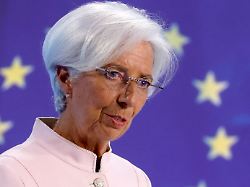The key interest rate remains at 4.5 percent
European Central Bank decides to pause interest rates
October 26, 2023, 2:15 p.m
Listen to article
This audio version was artificially generated. More info | Send feedback
After ten hikes, it’s over for now: the ECB is refraining from making any further interest rate hikes and is taking a break. The key interest rate therefore remains at 4.5 percent.
The European Central Bank (ECB) is taking a pause on interest rates for the first time in the fight against inflation after ten interest rate increases in a row. At their external interest rate meeting in Athens, the monetary authorities led by central bank chief Christine Lagarde decided not to touch the key interest rates. The relevant deposit rate on the financial market, which financial institutions receive from the central bank for parking excess funds, remains at the record level of 4.00 percent. The key interest rate remains at 4.50 percent.
“The future decisions of the ECB Governing Council will ensure that key interest rates are set at a sufficiently restrictive level for as long as necessary,” said the euro watchdog. When determining the appropriate level and duration of the restrictive level, the Governing Council will continue to pursue a “data-driven approach”. This means that the Euro Central Bank has now probably reached the interest rate peak for the time being on the tightening course it initiated in the summer of 2022.
Inflation in the 20-country community has recently fallen significantly. In September it fell to 4.3 percent from 5.2 percent in August. As recently as autumn 2022, the rate was at times over ten percent. However, inflation is still more than twice as high as the Euro Central Bank’s target of two percent.
The weakened economy in the euro area may also have played an important role in the ECB’s decision. According to a survey, the economy had recently accelerated its decline. The purchasing managers’ index for the private sector – industry and the service sector together – fell by 0.7 points to 46.5 points in October. This is the lowest level in around three years. In addition, according to the Bundesbank, the economy in Germany is likely to have shrunk in the summer quarter. If economic output declines again in the current fourth quarter, it will be referred to as a “technical recession”.
In addition, the escalated Middle East conflict has become a new uncertainty factor for the monetary authorities, which could affect, among other things, energy prices. It is therefore eagerly awaited what ECB President Lagarde will say about the economy and the future interest rate path. The question is whether it explicitly keeps the possibility of further interest rate increases open or whether it gives a more neutral outlook and emphasizes the data dependence of every decision. According to a recent survey by the Reuters news agency, a majority of economists expect the ECB to keep the deposit rate constant until mid-2024.
